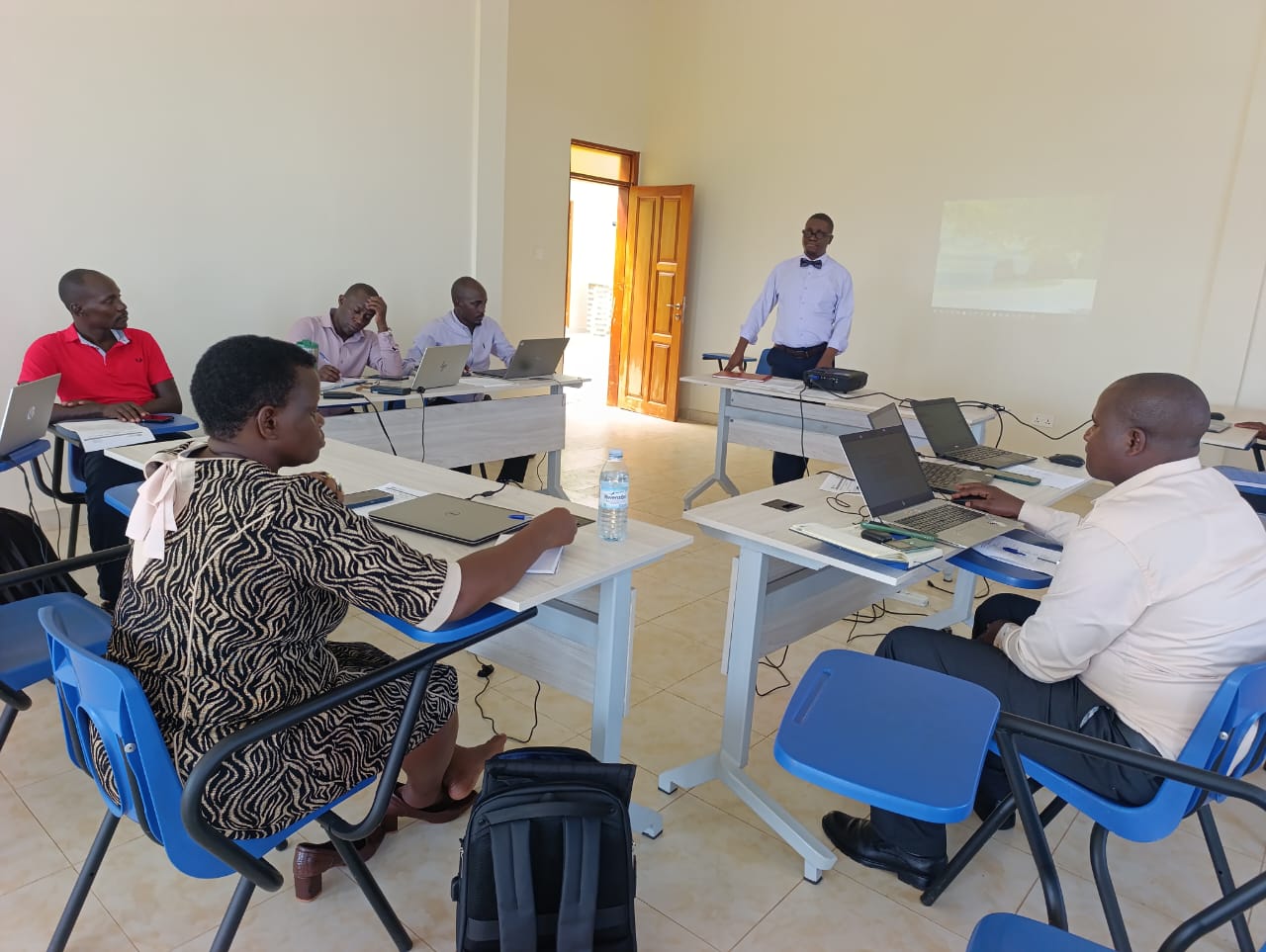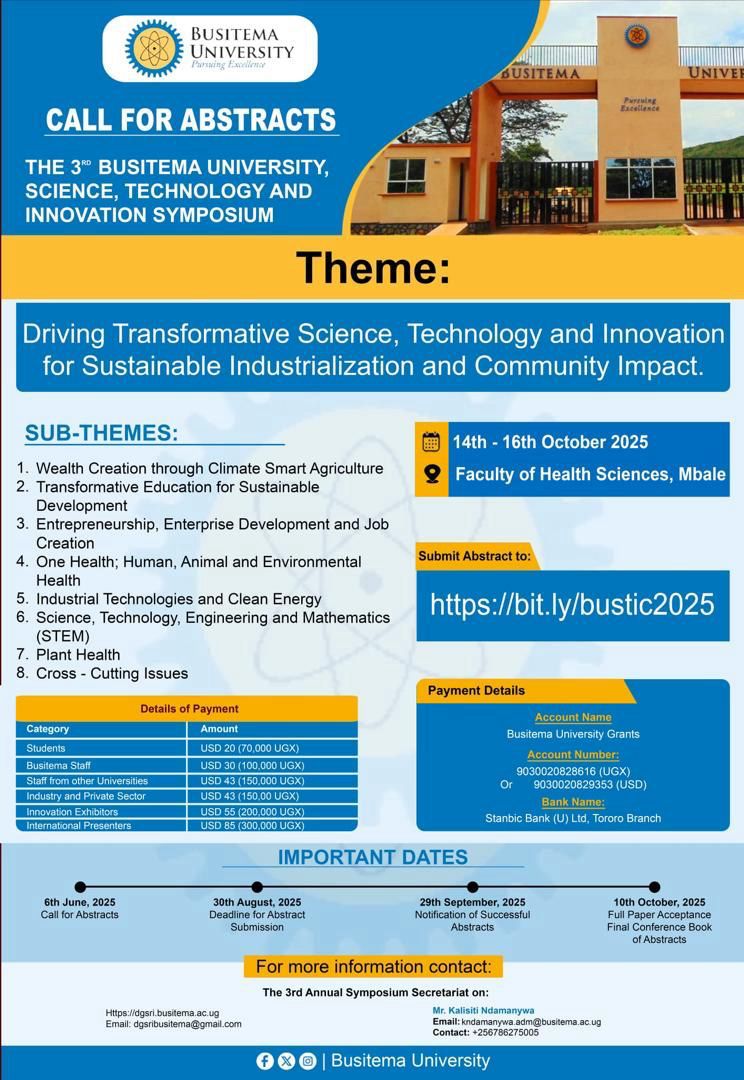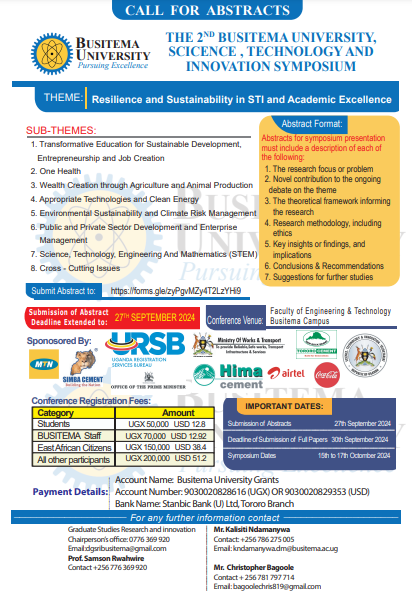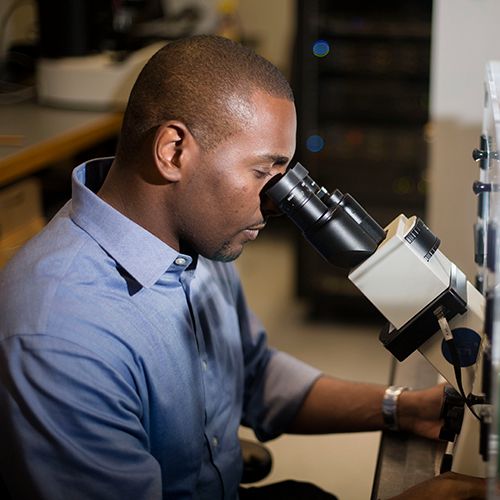
The DGSRI, invites applications for the Busitema University Research and Innovation Fund (BU-RIF) in any Busitema University thematic research priority areas for the year 2022/23.
The BU-RIF grant will last for utmost 12 months and will support high impact
research and innovation projects within Busitema University
University Research Agenda
The process of developing the research agenda was highly participatory. A consultative meeting was held with Deans, Heads of Departments and senior academic staff, the drafted research priority areas were circulated to the university community for input and finally, the research agenda priorities were harmonized with the NDPIII.
OBJECTIVES AND SCOPE
Objectives
The objectives of the BURIF programme include the following:
- To strengthen and build the research capacity of Busitema University staff.
- To foster interdisciplinary research within the university research agenda thematic areas.
- To increase the university’s visibility
Scope
The programme will support projects in the following Busitema University research agenda priority areas as set out in the university research agenda:
- Transformative Education for Sustainable Development, Entrepreneurship and Job Creation
- One Health
- Wealth Creation through Agriculture and Animal Production
- Appropriate Technologies and Clean Energy
- Environmental Sustainability and , Climate Risk Management
- Public and Private Sector Development and Enterprise Management
- Science, Technology, Engineering And Mathematics (STEM)
- Cross-Cutting Issues
Each applicant should submit only one (1) application in one of the research priority area indicated above.
Applications will be assessed on a competitive basis, to optimize the contribution made through GoU investment towards research.
The projects should have a clear indication of their contribution to:
- Sustainable Development Goals(SDGs)
- Uganda Vision 2040
- National Development Plan III.
In the year 2023, Thirty (30) BU-RIF projects across three categories will be awarded through a competitive selection process. Each grant will be assessed vigorously for value for money
| Category 1 – Multidisciplinary Research Teams/ Project Rollout to the Community Category 2 – Individual Research Projects Category 3 – Early career Research Projects |
The recommended duration is 12 months; all projects should ideally be done by June 2023.
APPLICATION AND ELIGIBILITY
Application process
Research proposals must be submitted electronically (online) at the platform https://forms.gle/34W4ML6qRzYSkYt8A by Friday, 20th August 2022, 3:00PM East Africa
The Research Grants Management Committee will not consider applications submitted by any other means. Applicants are therefore advised to prepare their submissions on-time. If an applicant experiences any challenges in the submission process, they should send an email to: dgsri@adm.busitema.ac.ug and c.c. to rbsjunior@gmail.com
Eligibility
- A full-time Busitema University staff who hold a valid and current appointment specifically issued by the Directorate of Human Resources.
- Individual researchers or research teams will be required to have a letter of support from the Head of the academic unit under which the lead researcher is tenured.
- Researchers from other institutions of higher learning are not eligible to neither apply as principal investigators (PI) nor co-PI but can be collaborators.
- The PI shall be actively in service (not on study or sabbatical leave.
- The PI shall attach a copy of his/her appointment letter or mostrecent letter of promotion.
- A researcher cannot be a PI on more than ONE application. It is allowable for any person to be a team member on up to a maximum of three applications.
- For each application, it is a requirement to indicate a co-Principal Investigator who will be co-signatory to the contract upon award and will be jointly responsible for the results; the requirements for one to be a co-PI are similar to those required of a PI.
- All projects should include students as part of the research teams.
- Applicants must have earned at least a masters or doctorate degree in an academic discipline or professional field.
- Applications should be accompanied with a research proposal to be submitted online.
- Collaborations with research personnel with a minimum of a master’s degree from government agencies, civil society organizations, independent research institutions, business and industry is encouraged.
Eligible Expenses
- Budgets should be submitted online using the budget template and should be for one financial year.
- Acceptable expenses are those normally associated with research: data collection, analysis, report writing, computing costs; equipment; travel to Conferences; development of new research technology and domestication of technology is welcome.
- Multi-year projects should indicate so but should only submit budget for one financial year.
- Requests to fund article processing charges (APCs) will be handled on case by case basis, however, this will only happen for manuscripts that are written and ready for publication, or in the publication pipeline (accepted or in press). The grant will only carter for APCs for journals with Impact Factors or indexed in reputable databases.
- Under personnel costs, researchers should not budget for salaries for staff who are on government payroll because this will constitute double payment, however, a budget for key critical project staff (Research Assistants, Project Coordinators, Administrative Assistants, Graduate Fellows etc.) not under the government payroll can be budget for.
- Researchers should submit a clear work plan with clearly marked deliverables within the project lifespan. These will be used for the budget monitoring and implementation.
SELECTION AND ASSESSMENT PROCESS
The selection will follow a two stage process:
Stage I
All proposals will undergo an eligibility check and the eligible proposals will undergo an independent evaluation system; technical blind peer-review process.
Stage II
A technical university committee will assess the results from the reviewers and recommend viable projects to the Research Grants Management Committee (RGMC).
The final selection of proposals will be undertaken by the University Research Grants Management Committee (RGMC). The RGMC reserves the right to determine/change the number and size of awards based on prevailing circumstances informed by demand, quality of applications, availability of funds and level of utilization of funds by grantees.
ASSESSMENT CRITERIA
Selection of the research proposals follows the following assessment criteria:
Innovation
Does the research involve the development of new methods, the integration of existing methods into new tools, or the application of existing methods in a novel way that improves and extends their utility? Proposals which simply apply existing methods in conventional contexts will not be considered innovative.
Scientific Excellence and Originality
Is the proposed research potentially of very high quality in relation to the highest international standards of scientific excellence in all of the sectors and disciplines that it includes? Would the project add value to existing research on the topic of the proposal? Are the proposed methods sound and is the proposed research feasible?
Development Relevance
Does the proposed research address issues that present significant challenges to the specified field? Are the anticipated development outcomes and possible pathways to impact clearly and convincingly argued? Have gender issues been mainstreamed in project design and objectives?
Equity and Inclusion
Measures will be taken to ensure that all faculties will benefit from the fund. The University Research Grants Management Commitee (RGMC) will also ensure that women researchers and junior faculty are well represented in the grant portfolio.
CONTRACTING AND AUDIT
Successful grant applicants will be required to enter into a research and Innovation(R&I) grant agreement with the University and be subject to technical and financial audit as per the university regulations.
All funds disbursed shall be accounted for in a timely and acceptable manner as per the university accounting principles.
REPORTING REQUIREMENTS
The successful applicant must submit a progress report every month to the DGSRI on the progress of the project with justification and copy of publication(s) resulting from the project.
DISSEMINATION AND DATA SHARING
Information about research funded by the University will be made available on the University website. Grant holders will be expected to promote the dissemination of the results of their research as widely as possible, based on the premise that publicly-funded research data are a public good, produced in the public interest, and should be made
openly available to other researchers in a timely manner to the maximum extent possible
REVIEW PROCESS OF FULL APPLICATION
Merit Criteria
Applications will be referred to an evaluation panel. Panel members shall be required to sign appropriate non-disclosure agreements. If a member of the evaluation panel shall have a direct conflict of interest in relation to a proposal, he/she would be required to declare it and to abstain from participation in ranking the relevant proposal(s).
The evaluation panel will then make a detailed assessment of each proposal – which, as need arises, shall involve a viva voce with the research teams. The panel shall report to the DGSRI on its findings and provide recommendations regarding those proposals deemed most worthy of funding. On the basis of this report, and with regard for the total funds available, a recommendation will be made to the University.
Summary of Selection and Merit Criteria
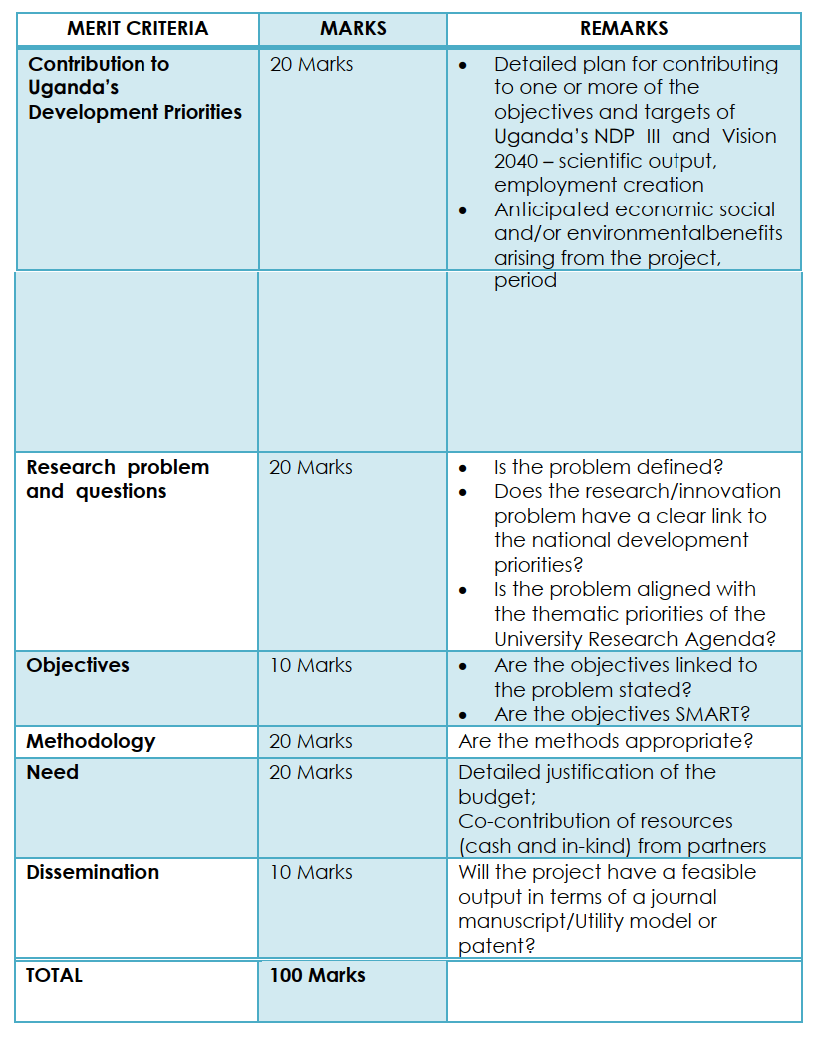
PASS MARK
For the purpose of this call, the pass mark shall be 60%, however, grants will be awarded based on the availability of funds and on a competitive basis.
NOTIFICATION OF SUCCESSFUL APPLICANTS
Successful applicants will be informed by email. Researchers should be cognizant of the fact that not all research applicants should expect to be funded - this is a normal part of the grants processes.
The RGMC will be as impartial and as technical as possible in the selection process to ensure that the best projects win. Not winning a grant should therefore not be construed as being a result of an unfair selection processes.
POST-AWARD PROCESS
Due to the urgent need of results from the grant, the DGSRI will conduct several post-award activities before the release of the funds to the grant beneficiaries:
- Awardees will attend a mandatory online training in financial grant management and accounting for research grant.
- Since the funding is from the GoU, awardees will be required to develop a procurement plan for key project items.
- All awardees will sign a contract with the Grants Management Unit.
- The release of project funds will be in phases subject to proper accountability and achievement of key project milestones.
- The Grants Management Unit will track project deliverables and accountability. Consistent failure to demonstrate deliverables or utilize funds might lead the decision of issuance of unspent balances to other grantees or reserve projects.
- Awardees will attend training on manuscript publishing, writing of patents and policy briefs.
INTELLECTUAL PROPERTY
- The Busitema University Intellectual Management Policy shall apply.
- Intellectual Property derived through the Government grants will be owned jointly by the awardee Teams and Busitema University as stipulate.
- All awardee teams grant to Busitema University and the Government of Uganda a non-exclusive, royalty-free, perpetual license to use any resultant or derived intellectual property (e.g., product, service, or technology) that will be developed using the Government grants for development work of public benefit without encumbrance.
- For IPs with commercial value, the University Intellectual Property Management Committee will undertake a determination of what percentage of stake the university will claim on the basis of its investment into the idea.
- All proceeds accruing from commercialization of IP generated via government grants, following the conclusion of the grant period will be negotiated on a case-by-case basis amongst the parties, but with the researchers taking a controlling stake.
IMPORTANT DATES

